Corrugator supercilii muscle
The corrugator supercilii muscle is a small, narrow, pyramidal muscle close to the eye. It arises from the medial end of the superciliary arch, and inserts into the deep surface of the skin of the eyebrow. It draws the eyebrow downward and medially, producing the vertical wrinkles of the forehead.
| Corrugator supercilii muscle | |
|---|---|
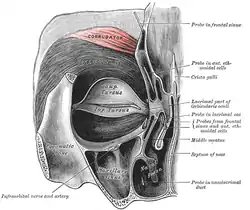 Left orbicularis oculi muscle (notice the corrugator muscle at the top) | |
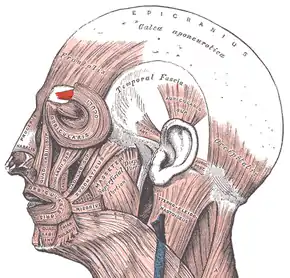 Corrugator supercilii | |
| Details | |
| Origin | Supraorbital ridge ( Superciliary arches ) |
| Insertion | Forehead skin, near eyebrow |
| Artery | Ophthalmic artery |
| Nerve | Facial nerve |
| Actions | Wrinkles forehead |
| Identifiers | |
| Latin | Musculus corrugator supercilii |
| TA98 | A04.1.03.018 |
| TA2 | 2071 |
| FMA | 46794 |
| Anatomical terms of muscle | |
Structure
The corrugator supercilii muscle is located at the medial end of the eyebrow, beneath the frontalis muscle and just above the orbicularis oculi muscle.
It arises from the medial end of the superciliary arch. Its fibers pass upward and laterally, between the palpebral and orbital portions of the orbicularis oculi muscle. It inserts into the deep surface of the skin of the eyebrow, above the middle of the orbital arch.
Relations
The supratrochlear nerve passes by the corrugator supercilii muscle between it and the frontalis muscle.[1]
Function
The corrugator supercilii muscle draws the eyebrow downward and medially, producing the vertical wrinkles of the forehead.[2] It is the "frowning" muscle, and may be regarded as the principal muscle in the expression of suffering. It also contracts to prevent high sun glare, pulling the eyebrows toward the bridge of the nose, making a roof over the area above the middle corner of the eye and typical forehead furrows.[3]
Clinical significance
The muscle is sometimes surgically severed or paralysed with botulinum toxin as a preventive treatment for some types of migraine or for aesthetic reasons.[4]
Etymology
The name corrugator supercilii comes from Latin, and means wrinkler of the eyebrows.
Additional images
 Corrugator supercilii seen from the inside.
Corrugator supercilii seen from the inside.
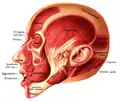
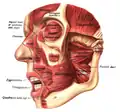
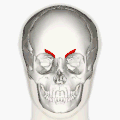 Position of corrugator supercilii muscle (red)
Position of corrugator supercilii muscle (red) Outer surface of frontal bone.
Outer surface of frontal bone.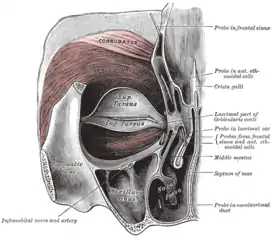 Visible on upper portion of face.
Visible on upper portion of face.
References
![]() This article incorporates text in the public domain from page 907 of the 20th edition of Gray's Anatomy (1918)
This article incorporates text in the public domain from page 907 of the 20th edition of Gray's Anatomy (1918)
- Lasaosa, S. Santos; Pérez, M. L. Cuadrado; Peral, A. L. Guerrero; Villanueva, M. Huerta; Porta-Etessam, J.; Pozo-Rosich, P.; Pareja, J. A. (2017-06-01). "Consensus recommendations for anaesthetic peripheral nerve block". Neurología (English Edition). 32 (5): 316–330. doi:10.1016/j.nrleng.2016.04.002. ISSN 2173-5808 – via ScienceDirect.
- Cattaneo, Luigi; Pavesi, Giovanni (2014-01-01). "The facial motor system". Neuroscience & Biobehavioral Reviews. 38: 135–159. doi:10.1016/j.neubiorev.2013.11.002. ISSN 0149-7634 – via ScienceDirect.
- "eye, human."Encyclopædia Britannica from Encyclopædia Britannica 2006 Ultimate Reference Suite DVD 2009
- de Ru JA, Schellekens PP, Lohuis PJ (2011). "Corrugator supercilii transection for headache emanating from the frontal region: a clinical evaluation of ten patients". J Neural Transm (Vienna). 118 (11): 1571–4. doi:10.1007/s00702-011-0654-1. PMID 21597942.
{{cite journal}}: CS1 maint: multiple names: authors list (link)